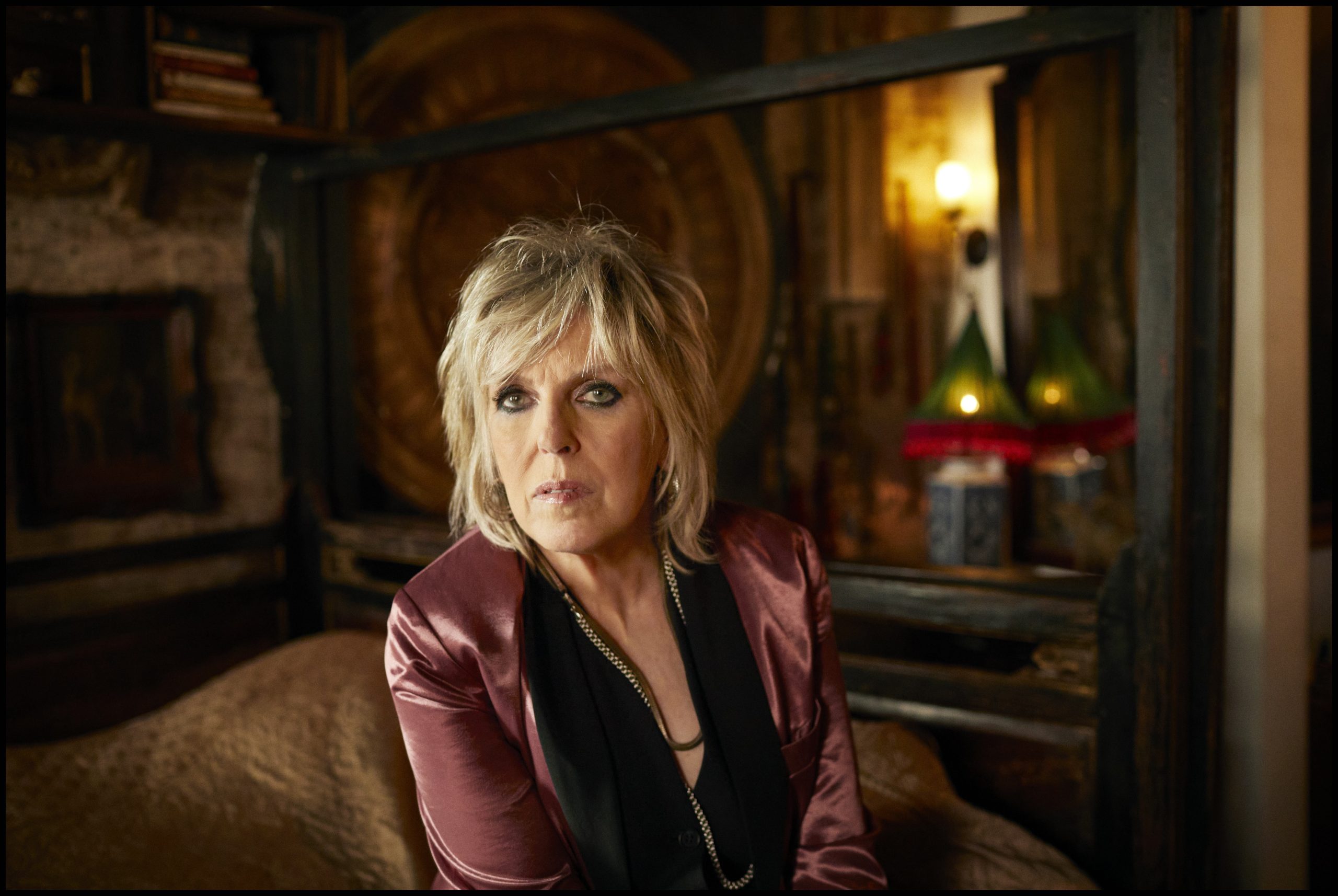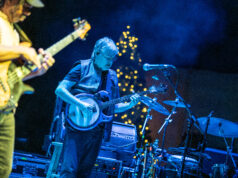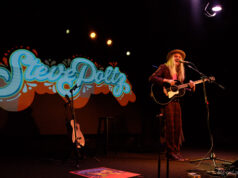In a two-and-a-half tour de force at Capital One Hall recently, Lucinda Williams delivered a career retrospective. A unique American life, Lucinda’s story touched on not only her life, but on the history of popular music since the birth of rock ‘n’ roll. And it showed that Williams is a survivor.
The child of poet and academic Miller Williams, Lucinda grew up all over the Deep South. Her father exposed her to literature and music. Williams started off her set by recounting how, when her family was living in Macon, her father took her downtown to see a blind preacher and blues-gospel singer, Blind Pearly Brown, which inspired her song of that name.
In 1965, when Lucinda was 12 years old, Miller was teaching at Louisiana State University, and the family was living in Baton Rouge. It was at that time that she started learning to play guitar, taking lessons from a guy in a rock band. Her learning style was unconventional: Rather than master scales, she learned to play entire songs, which she feels is a better way for most students to learn the instrument.
The folk revival was in full swing in 1965, and it was those artists that captured her attention: Bob Dylan; Joan Baez; Peter, Paul, and Mary; Gordon Lightfoot; and Judy Collins were names she mentioned in particular. At that time, blues was strongly associated with folk-music, especially what people call folk- or country-blues. One of the first songs she learned to play was Elizabeth Cotten’s “Freight Train.” Cotten, she noted, worked as a housekeeper for the Seeger family.
Bob Dylan would prove me the biggest and most enduring influence on her work. At Capital One Hall, Lucinda recalled how one of her father’s creative writing students brought Highway 61 Revisited when he came to their house for a meeting with her father. She immediately fell in love with the picture of Dylan on the cover in motorcycle gear, which became the type of man she’s been most attracted to throughout her life. She even named her band Buick 6 after Dylan’s “From A Buick Six.” As Lucinda and her band played “It Takes A Lot To Laugh, It Takes A Train To Cry,” the screen behind them displayed a slideshow of photos of Dylan.
Another major influence on her work was Hank Williams, who her father once met in Lake Charles. After a show, the two men went for a drink. Hank told Miller, “You oughta be drinking beer, ’cause you have a beer drinking soul.” This was, Lucinda said, Hank’s way of recognizing Miller as, at his core, “an Arkansas country boy.” She and her band played Hank’s “Jambalaya.” Lucinda scoffed at the idea of referring to Hank as “Hank Williams, Sr.,” saying “there’s only one Hank Williams,” which may have been a dig at Hank Jr. and Hank III.
In 1978, Williams recorded her first album, Ramblin’ On My Mind, a collection of folk, country, and blues covers for the Smithsonian Folkways label, at Malaco Studios in Jacksonville, Mississippi. (If you’re interested in the history of that studio and label, I recommend the chapter about in Peter Guralnick’s Looking To Get Lost.) For this record, she got a $250 check.
The next year, she followed up with her first album of original songs, Happy Woman Blues, also on Smithsonian Folkways. She recorded the album at Sugar Hill Studios in Houston, with Wrecks Bell, who played with Townes Van Zandt and Lightnin’ Hopkins, on bass. For this record, she recalled, she got a $500 check. After telling this story, Lucinda and her band played the title cut from this second album.
Stream “Happy Woman Blues” by Lucinda Williams on YouTube:
In 1974, Lucinda found herself in Austin, during what was a vibrant period in that city’s music scene. “Cosmic cowboy music” was all the rage; she described the folks in this scene as “cowboys who took LSD” and “longhaired rednecks.” Gram Parsons was an influence on this scene (and on Lucinda) but she also mentioned Buffalo Springfield, and especially Neil Young, The Band, and Creedence Clearwater Revival.
While there was a scene in Austin, Lucinda left for Los Angeles, which had more of a music business presence. People in Austin warned her Los Angeles would “eat me alive.” She landed there at a time when that city’s roots music scene was booming. She namechecked Dave Alvin and the Blasters, Rosie Flores, Dwight Yoakam, and the bands Blood on the Saddle and Green on Red.
In Los Angeles, she played bars and clubs, and she recorded some demos that made their way around to the record labels. One piece of feedback she got was that her songs didn’t follow traditional song structure. “Crescent City,” which appeared on her eponymous 1988 album for Rough Trade, a European label specializing in punk, and was recorded by Emmylou Harris, didn’t have that structure.
Speaking about her Los Angeles experience, Lucinda got into the subject of marketing, and of how labels didn’t think they could market her. In the music business, she said, the artist is the product, and labels need to know how to characterize that product. Her music, which drew on such a wealth of influences, was and still is hard to pigeonhole. She said she’s seen her records in stores in the bins for folk, country, and rock.
Lucinda Williams proved to be her initial breakthrough. In addition to Harris’s cover of “Crescent City,” Mary Chapin Carpenter recorded “Passionate Kisses,” and Tom Petty recorded “Changed the Locks.” A few years after the album came out, Lucinda won her first Grammy, for Best Country Song, for “Passionate Kisses.” The album also made Rolling Stone’s music recent iteration of its top 500 albums list.
An even bigger commercial breakthough came with her 1998 masterpiece Car Wheels On A Gravel, which won the Grammy for Best Contemporary Folk Album. (She’s since won a third Grammy for Best Rock vocal for “Get Right With God.”) The album took a long time to make: it had been six years since she released her previous record, 1992’s Sweet Old World. But it was worth the wait, as the album is recognized as a stone-cold classic. Rolling Stone ranked it in the top 100 albums ever made.
Watch Lucinda Williams perform “Get Right With God” live at Farm Aid 2004 on YouTube:
The first time Williams’s father heard the title track to Car Wheels On A Gravel was at the Bluebird in Nashville. When he came backstage, he apologized to her, saying “you’re the little girl in the back seat, ‘little bit of dirt mixed with tears.'” Until that moment, Lucinda hadn’t realized she was writing about herself. She speculated that distancing herself from the character in the song was a defense mechanism, because her writing was so “open and exposed.”
“Open and exposed” is a good way to describe most of Lucinda’s catalogs. It’s said that people relate to the specifics in songs and stories, and she knows how to be specific. She does it by drawing on the people and places who have meant the most to her, her Native and many of the “beautiful misfits” she’s met on her journey. “Bus To Baton Rouge” was inspired by her maternal grandparents’ home in that she city. She recalled the fig trees in the yard, and how her grandmother made her own fig preserves.
Family, as you’ve seen, is something that comes up frequently in the songs. Lucinda described her younger brother as “smart as a whip, but somewhat of a rascal.” Of the three kids in the family, he was the only one who learned to play piano. He was an intellectual — he read all of Shakespeare when he was 15, then moved on to commentaries and criticism — but he had a dark side. Their mother had major mental health issues, and her brother took after her, often disappearing from periods of time when he went to New Orleans. Williams has written a few songs about him, including “Are You Alright?” and “Little Angel, Little Brother,” which she included in the set at Capital One Hall on Oct. 24.
Through her father’s literary circles, Williams came to know a number of important figures. In her outstanding memoir, Don’t Tell Anybody the Secrets I Told You (a page-turner I finished in a day), she talks about meeting Charles Bukowski. She also got to know a young poet, Frank Stanford, when she was living in Fayetteville, when her father was teaching at the University of Arkansa. Frank was believed to have a promising career ahead of him, But he also had, as Lucinda put it, “demons.” He was a womanizer, and, when his cheating ways were revealed, he shot himself. His funeral, captured in “Pineola,” was remarkable for the cast of characters who came out to show their last respects.
Watch Lucinda Williams perform “Pineola” for her live album Live from Austin, TX, via YouTube:
“Lake Charles,” Lucinda explained, is “another beautiful misfit song.” It’s about one of her partners, Clyde Woodward III; she remarked, with a name like that, there are bound to some “interesting family dynamics,” and there were. Although he was from Nagadoches, in East Texas, Clyde would claim to be from Louisiana, and he had a special place in his heart for Lake Charles. Clyde liked to live hard, and “he overdid it,” which led to his early death. Lucinda recalled, with fondness, how they used to go to a place called Stop N Shop outside of the city that sold homemade boudin, a kind of spreadable Cajun sausage that she insisted can only go on Saltine crackers.
During her time in Houston and Austin, Williams got to know the mercurial songwriter Blaze Foley. A great songwriter, his “If I Could Only Fly” was recorded by Merle Haggard. But Blaze kept “shooting himself in the foot.” Like his friend Townes Van Zandt, Blaze struggled with addiction and substance abuse. Tragically, he was killed in 1989 when he tried to intervene in a dispute between a friend and the friend’s son. Williams wrote “Drunken Angel” about him.
Up until this point in the show, Lucinda had delivered her songs and stories while sitting in a chair, but she stood up for the rest of the evening. The stories got a bit shorter, and the show moved a bit faster. “Those Three Days,” she said, is “a pretty hard look at an unrequited love situation.” That was followed by “Fruits of My Labor.” “Heaven Blues,” she explained, was influenced by the gospel-blues tradition of Blind Pearly Brown and Mississippi Fred Mcdowell. “Real Love,” she said, “feels like something that could’ve been recorded by the Bangles,” and featured Susanna Hoffs and vocals. “Dust” was adapted from one of her father’s poems.
When she played the historic Cox Theater in Macon, Georgia, Williams realized that it was just off of Highway 20, which runs through many of the cities where she grew up. “Ghosts of Highway 20” explores her relationship with that highway and those cities.
I’ve come this far in this article without even mentioning her latest album, Stories From A Rock & Roll Heart, which came out earlier this year. “Where The Song Will Find Me” is “an ode to the song itself.” Songs, she said, have been the biggest thing in her life since she was 12. On the album’s title cut, she was joined on vocals by Bruce Springsteen and his wife, Patti Scialfa. She closed her set with “Joy.”
For someone who has survived not one, but two strokes since 2020, Lucinda’s performance was all that much more impressive. She’s a tough cookie, a real survivor, and she continues to be an inspiration for many. Her music has deeply affected me and so many, many others, as has her strength and perseverance. Her recent Capital One Hall show was a spellbinding journey through her unique world.






